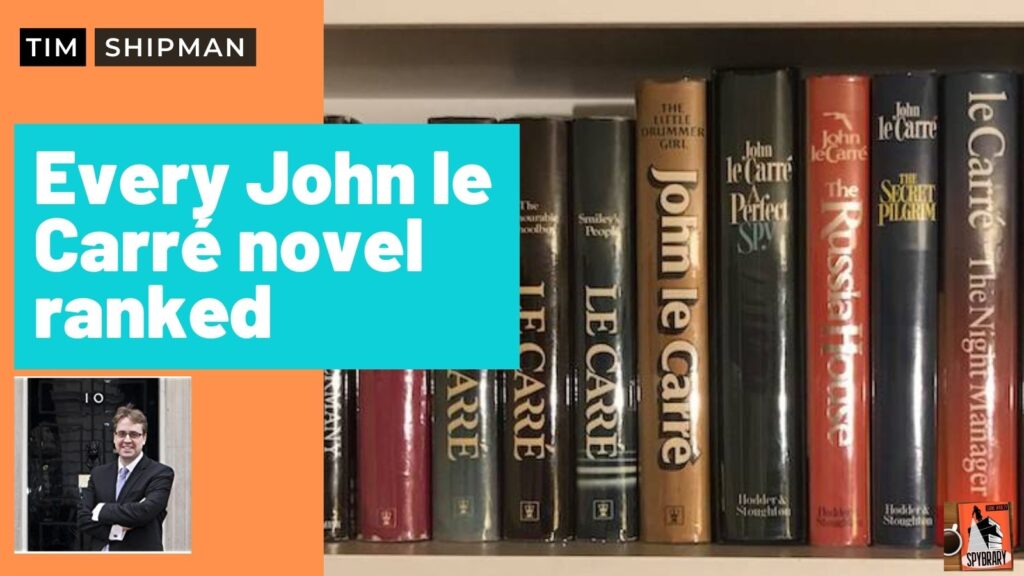
An essential guide to the spy novels of John le Carré by journalist, political commentator, author, and spy fan Tim Shipman.
OK shoot me… I love lists and they are a good place to start a debate. I’m going to rank John le Carré’s spy novels (so no Naïve and Sentimental Lover and Pigeon Tunnel) and you’re all going to disagree with me.
For those that don’t like it, I would argue this is at least a useful guide for new readers to what John le Carré novels they should be focusing on.
I’m going to do it two ways, the first chronological and then hierarchical (My rankings are: masterpiece, excellent, very good, good, for the completist). I’ve always seen his work in very distinct periods so here we go:
Spybrary note – I have linked to the novels on Amazon, we much rather you buy your books from a local bookseller of course, so these links are for reference, reviews and for those of you like me, who live out in the cold. Any purchases earn Spybrary a small commission which helps to keep the show on the air.
THE EARLY WORK 1961-68
1: Spy Who Came in From the Cold (1963 #3)
What else could it be? It was a breakthrough novel for a reason. Taut, tense, brilliant characters, proper plot, brilliant prose, the nasty sting in the tail, a distillation of his disgust with a world he was about to leave behind. Still the best answer to the “if you only read one…” debate in the hope that you will get people to read more of his work. Terrible indeed, but only for his rivals. In fact, this ensured that he would have none (Masterpiece)
2: A Small Town in Germany (1968 #5)
Seems to divide opinion here but it’s at once a brilliant look at the class intricacies of British bureaucracy and the diplomatic world and it’s not quite what it seems. To me it’s the book he needed to write to hone his technique for the Karla trilogy that followed (Excellent)
3: The Looking Glass War (1965 #4)
Bleak and almost satirical, this study of a mission doomed from the beginning to fail is definitely post-graduate John le Carré studies, rather than entry level amuse bouche, but it seems underrated to me and the best summary of his distaste for his old profession (Good)
4: Call For the Dead (1961 #1)
Perhaps the best first description of any espionage character on the opening page. Smiley. Mendel. Guillam. Mundt. A spy plot dressed up as a murder mystery. It’s remarkably accomplished for a first time author, but to me it’s really more interesting after you’ve read Spy Who… and the Karla trilogy.
(Good)
5: A Murder of Quality (1962 #2)
Perfectly enjoyable but a lot of detective fiction writers do this stuff better
(Completist)
PEAK COLD WAR ESPIONAGE 1974-86
1: Tinker, Tailor, Soldier, Spy (1974 #6)
For my money, the greatest spy thriller ever written. The best author, in his best period, doing his version of the biggest scandal ever to engulf British intelligence, the quest for the mole at the heart of the Circus. It is beautifully written and plotted and I can’t imagine it will ever be bettered. And if it matters to you the film is brilliant and the BBC mini series may be the best TV programme ever made as well.
(Masterpiece)
2=: The Honourable Schoolboy (1977 #7)
The marmite John le Carré. His longest and possibly most accomplished work, the writing may be even better than in Tinker Tailor. You can’t read this and not think him a great novelist. Some find it difficult to get into. Yes, it's labyrinthine and you have to settle in knowing that it's secrets will be slowly laid bare. Just revel in the writing as you go and enjoy both a great central character who emerges from his bit part in TTSS and a wonderful evocation of the far east, a region he does not usually visit. But for all its languor it also contains some of the best action scenes Le Carré ever wrote. The first 50 pages when the pissed up press pack discovers the circus has left town is (for this hack of 25 years) the best thing ever written in fiction about journalists
(Masterpiece)
2=: A Perfect Spy (1986 #10)
Philip Roth called this the best English novel since the war and he may be right. I always think of this hugely autobiographical work as Le Carré’s best novel, even if it is not his best spy thriller. Pym is the best drawn character he ever wrote, though remains a mystery. There is a plot and it’s deft but it’s not the point of the book.
(Masterpiece)
4: Smiley’s People (1979 #8)
Some think this le Carré’s best book (I’m looking at you Michael Smith) and that’s a valid point of view as it pits arguably the greatest spy character Smiley more directly against his nemesis, the Eastern bloc spy chief Karla. It’s clearly in his top five and I’ve ranked it fourth here, which only goes to show what a magnificently productive period this was. It’s a perfect coda to the greatest trilogy in spy fiction.
My only argument in ranking it this low is that its magnificence is achieved precisely because it reflects on what went before, whereas TTSS and THS stand alone in their greatness. The cigarette lighter moment may be the most indelible image he ever wrote, “You won George.” “Did I? I suppose I did,” may be his best ever lines of dialogue, but you have to have read the others to understand why. Also a brilliant BBC series, which many think is a clearer recitation of the central storyline.
(Excellent, nearly a Masterpiece)
5: The Little Drummer Girl (1983 #9)
In other periods le Carré’s take on the Middle East intelligence battle would rank very highly indeed. One of his better female characters too. Much better than the TV series (Very good)
THE POST-COLD WAR WORLD 1989-2001
1: The Constant Gardener (2001 #17)
For many this is le Carré’s forgotten period but it was actually extremely productive as he turned his attention to the dissection of modern industries and rampant capitalism where moral certainties, even in so far as they existed in his fiction before this, were gone. He was never better than in this tale of a mysterious disappearance, big pharma, a love story, a quality twist and the first vestiges of the righteous anger that would creep into a lot of his later work. The embassy scenes in the first half are his greatest modern pages on the politics of bureaucracy. A good film, but this is top notch writing.(Excellent)
2: Our Game (1995 #14)
This excursion to the Caucasus is as evocative as the Honourable Schoolboy for a less fashionable locale. Gripping and angry.
(Excellent)
3: The Russia House (1989 #11)
A super look at Russia after the certainties of the Cold War have gone. Barley Blair is one of le Carré's best characters and the love interest is on a par with Constant Gardener.
(Very good)
4=: Single and Single (1999 #16)
Le Carre peers inside the nexus of finance, money laundering, Russian oligarchs and intelligence in the wild west days as the USSR fell. I really love this book but he’s written too many good books.
(Very good)
4=: The Night Manager (1993 #13)
I actually look more fondly on this long but gripping look at the arms and drugs trades since watching the top-notch mini series.
(Very good)
6: The Tailor of Panama (1996 #15)
The first Le Carre I ever read maintains a key place in my heart. It’s also a very good first le Carré since the homage to Our Man in Havana means the new reader knows roughly where it is going. But for the fact that the central conceit had been devised by Graham Greene, you might say this is even better.
(Good)
7: The Secret Pilgrim (1990 #12)
The book in which Le Carré was most obviously scrabbling around for a purpose after the end of the Cold War is a bit of a mishmash of things, but it had a guest appearance from Smiley and a poignant lead character. Hard not to say it’s good, but it’s one for late in your reading cycle.
(Completist)
THE WAR ON TERROR AND BEYOND 2003-19
1: Agent Running in the Field (2019 #24)
Lots of you will hate this ranking. To its critics this is a shrill bellow from an old man disillusioned by Brexit, but I think you’ve got it wrong. Brexit drives the deftly-drawn characters (and presumably the author’s rage) but the last laugh is on the remoaner tendency, which is a great bit of Le Carré subverting expectations. It’s just a very accomplished self-contained study of an intelligence operation that includes some of his best writing for years (including the first service wife who is properly drawn with agency of her own). This period as a whole is a definite drop off in quality for me but it nonetheless represents a great body of work and to have one of his best recent works right at the end was a pleasant surprise.
(Very good)
2: A Most Wanted Man (2008 #20)
Perhaps the best of Le Carré’s war on terror books, and a cracking film to boot with Philip Seymour Hoffman (my favourite modern actor) in the lead. This covers extraordinary rendition, the human rights industry and Anglo-American intelligence tensions. It crackles with fury but the story is strong enough to survive that.
(Good)
3: Absolute Friends (2003 #18)
The first book he wrote after 9/11 has one of Le Carrés best ever opening paragraphs as Ted Mundy contemplates mad King Ludwig’s castle as his “past returned to claim him”. Wonderful writing, a well developed friendship between the main characters and Shane Whaley is right that this is underrated. It hangs together well, but you can’t escape the conclusion that it is quite a slight story and not equal to the epic quality of the real events of that time.
(Good)
4: A Legacy of Spies (2017 #23)
Le Carré’s most eagerly anticipated novel for years is a great trip down memory lane for Smiley/Spy Who fans. But if I’m honest it doesn’t quite hang together. It remains a must read, but it’s not as good as it might have been and that’s a pity
(Good)
5: Our Kind of Traitor (2010 #21)
Lots of people seem to hate this book. I rather like it. It’s a good, simple story about the Russian mafia, with the cynical twist in the tail, but again it doesn’t matter. In anyone else’s hands the plot would be too thin. Elegant but empty.
(Completist)
6: A Delicate Truth (2013 #22)
This story of an SIS mission in Gibraltar gone wrong is another riff on real events. Done with aplomb but ultimately not one of his classics
(Completist)
7: The Mission Song (2006 #19)
An African coup, wicked Western meddling. Le Carré at his most self-righteous. (Completist)
FINAL RANKINGS
I find it impossible and meaningless to rank books across the ages within their tiers. Any one of the first four has a case as the greatest ever espionage novel. FWIW here they are:
MASTERPIECE: Tinker Tailor Soldier Spy, Spy Who Came in From the Cold, The Honourable Schoolboy, A Perfect Spy
EXCELLENT: Smiley’s People, The Constant Gardener, Our Game, A Small Town in Germany
VERY GOOD: The Russia House, The Little Drummer Girl, Single and Single, The Night Manager, Agent Running in the Field
GOOD: The Looking Glass War, A Most Wanted Man, Call For the Dead, A Legacy of Spies, Absolute Friends, The Tailor of Panama
COMPLETISTS: Our Kind of Traitor, A Delicate Truth, The Secret Pilgrim, A Murder of Quality, The Mission Song
READING ORDER
If you want to know what the fuss is about, start with Spy Who Came in from the Cold, then move on to the Karla Trilogy and then read the other excellent and very good books.
If you are nervous about his style and want something easy to introduce you to things you could try Call for the Dead first or something like Tailor of Panama or Absolute Friends.
BUT: Make sure you read the Karla trilogy in order and do not read anything with Smiley in it written after Tinker Tailor until you read all three because it will spoil the reveals.
My general advice would be to try to read something from each era to get a flavour of how he dealt with the different shapes of our world.
Since many Spybrarians find Honourable Schoolboy and A Perfect Spy take some getting into, I would not open them first.
I'd say even the bottom tier is of a quality that most writers can only dream of reaching.
Those of you who haven't read him, get to it. You're the lucky ones.
Those of you who have can now tell me why I'm completely wrong… Come and join us on the Spybrary Facebook Group and let us know what you think of Tim's rankings.
About Tim Shipman
Tim Shipman is the Political Editor of the Sunday Times and was previously the Deputy Political Editor of the Daily Mail, and Washington Correspondent for the Sunday Telegraph. He has also held several posts, both Political and Foreign, at the Daily and Sunday Express. You can also follow Tim on Twitter.
Raid the archive and listen to episode 42 of the Spybrary Podcast where Tim Shipman reveals which spy books he ranks in his top 5 ever spy novels. That is Dead Drop 5.
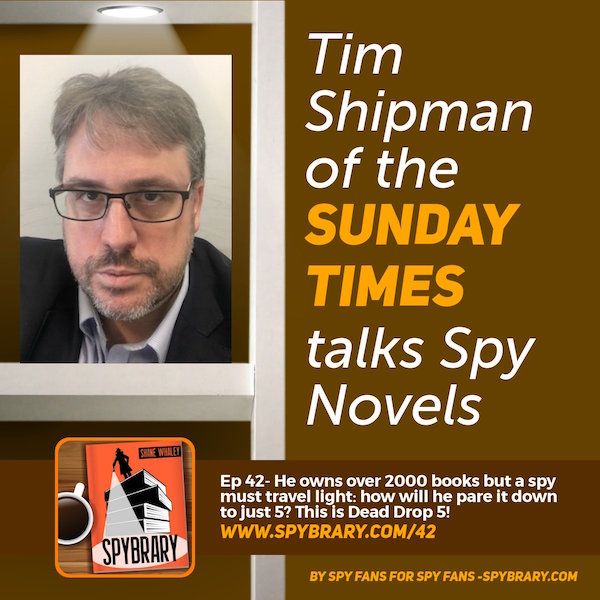
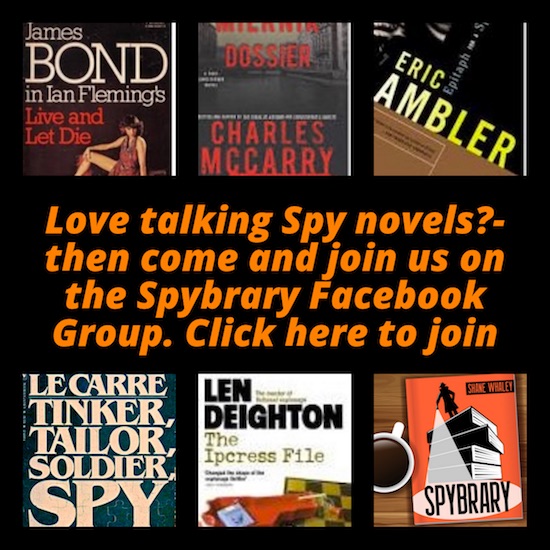
Love good spy books? Check out our feature-length interview with author Simon Conway on Episode 117 of the Spybrary Spy Podcast.

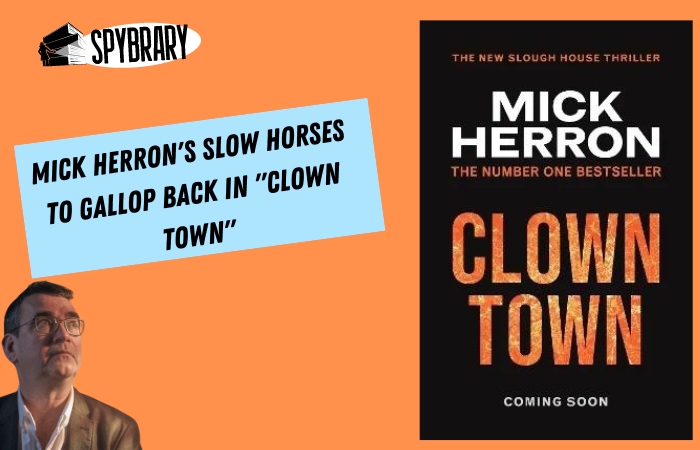
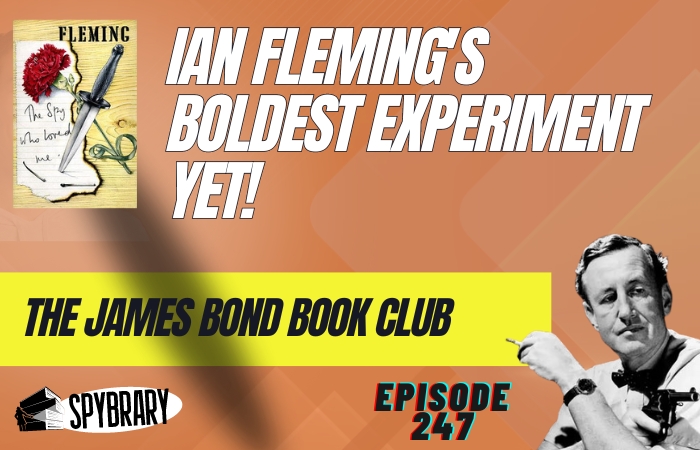



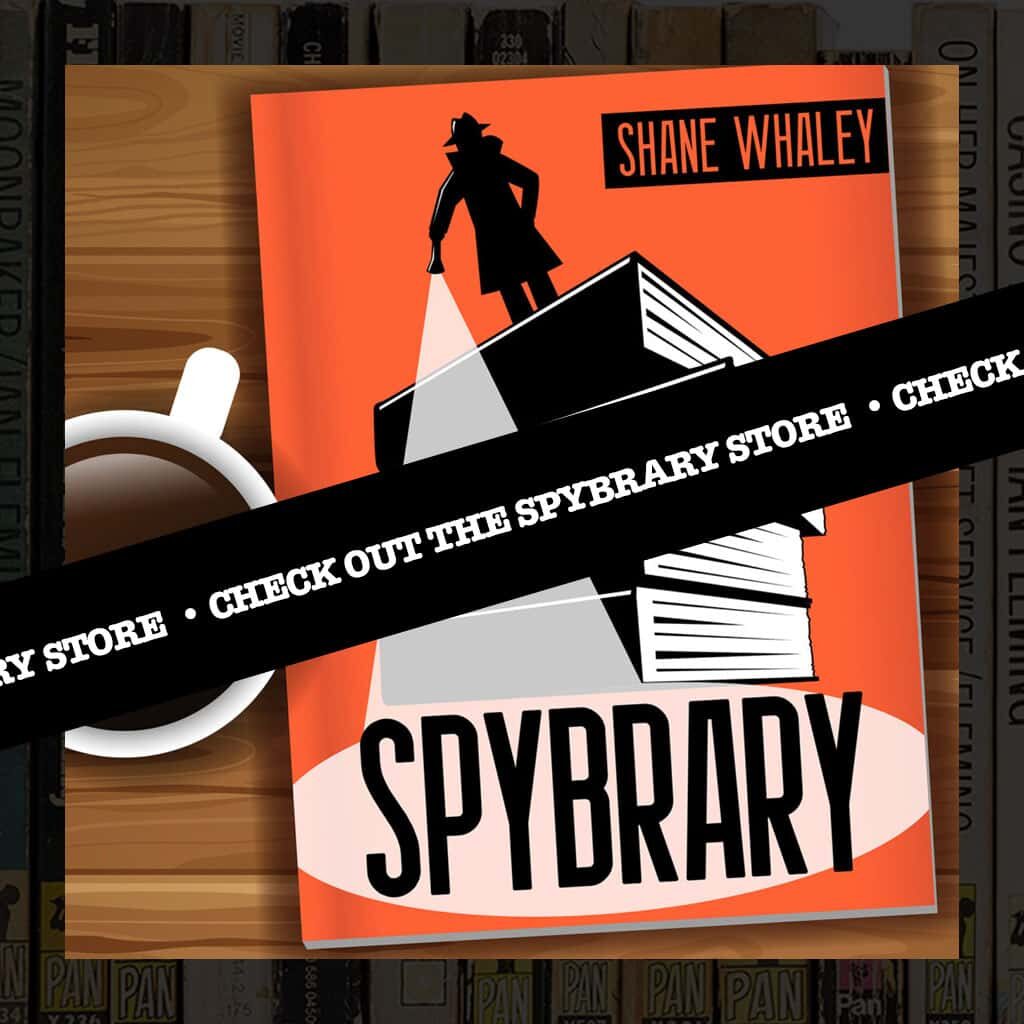
[…] run-up to the new year: a countdown of my top 120 spy authors. This is my third such list hereafter ranking the John le Carre novels and the James Bond films (coming soon.) This list has been a long while in gestation and brings […]
[…] each era to get a flavor of how he dealt with the different shapes of our world.Check out Tim's Every John le Carre Novel Ranked list, curated by […]